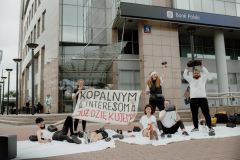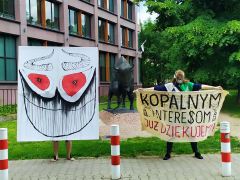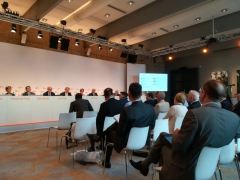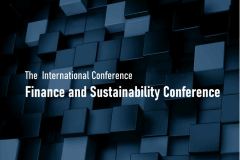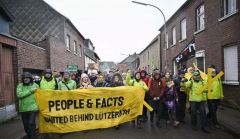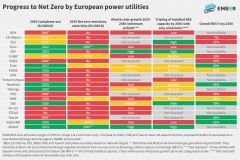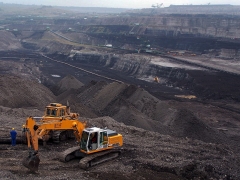Participation in general shareholder meetings of banks and insurers is an important area of our foundation's work. These meetings are an opportunity to ask the companies' boards of directors questions about their climate strategy, as well as to make other shareholders aware of where their money is going. This is an important part of climate shareholder activism, which we have written about on our website.
— Attending a shareholder meeting of an institution that financially supports the fossil fuel sector is also an opportunity to get important information or declarations from management. Under such circumstances, one can see which companies are taking the climate issue more and more seriously, and for which raising the topic is still a necessary evil. — comments Jan Chudzynski, financial specialist at the RT-ON Foundation.
This year we attended the general meetings of 5 companies: mBank, Santander Bank Poland, PKO BP, Pekao S.A. and PZU. Minority shareholders attended the meetings on behalf of our foundation to ask the companies' boards uncomfortable questions about their climate policies.
The events were accompanied by protests and happenings co-organized with art activist Arek Pasożyt and Extinction Rebellion.
Below are articles summarizing our participation in the AGMs of each company:
mBank:
https://rt-on.pl/en/green-finance/what-we-do-2/item/647-agm-2022-mbank
PKO BP:
https://rt-on.pl/en/green-finance/what-we-do-2/item/637-pko-bp-agm-2022
PZU:
https://rt-on.pl/en/green-finance/what-we-do-2/item/649-agm-2022-pzu
Pekao S.A.:
https://rt-on.pl/en/green-finance/what-we-do-2/item/651-agm-pekao-2022
Santander Bank Poland:
https://rt-on.pl/en/green-finance/what-we-do-2/item/650-agm-2022-santander
We realize how much financial institutions are contributing to climate crisis. That's why we participate in general shareholder meetings - meetings where key decisions on companies' strategies are made. In this way, we can put pressure on companies' boards of directors, but also show them the right course of action for the climate.
You can learn about the huge impact of the financial sector on climate from the "Banking on Climate Chaos" report, among others. Our foundation in May this year also published a report on the involvement of Polish banks in fossil fuels, taking into account the largest banks in Poland in terms of assets.
On June 15, 2022, we attended the Annual General Meeting of Bank Pekao S.A. The meeting was attended by our representative, who asked the board of directors questions about the bank's climate strategy. At the same time, a protest of the Foundation combined with a performance was held in front of the headquarters. Artist Arek Pasożyt painted a picture symbolizing Pekao's commitment to dirty fossil fuels.
This is how the board's answers were commented by our financial specialist, Jan Chudzyński:
— Bank Pekao SA has been criticized for years for its lack of any declaration or specified timeline for ending its financing of the coal and gas sectors. He justified his inaction in this area - very unconvincingly - by the events of the past few or so months. Answering questions at the AGM on these issues, the deputy chairman of the board cited the complicated international situation as the reason for maintaining such a state of affairs. As he added, only after the situation stabilizes will Pekao SA be able to... start working around the topic of discontinuing financing.
The bank's representatives did not address at all the issue of estimating Pekao SA's Scope 3 greenhouse gas emissions, included in the other two questions - another area in which Pekao SA stands apart from its competitors, as well as the issue of requiring its customers to declare and strategize to achieve climate neutrality.
Such an attitude and its translation by Poland's second largest bank in terms of assets is not only outrageous but, above all, contradictory to the actions necessary to reduce greenhouse gas emissions at an appropriate pace. —
Here are our questions posed at the AGM:
In the 2021 Board of Directors Report, you can read that the Bank supports a gradual and orderly transition to a low-carbon economy, by reducing the financing of energy production from fossil fuels, i.e. oil, gas and coal. I would like to ask what this means in practice:
1. Has there been a change in Bank Pekao SA's lending policy in the area of financing high-carbon sectors in 2021?
In addition to the exclusion of financing new mines and power plants, are there any other exclusions, following the example of other banks in Poland, for financing the coal sector?
2. Among fossil fuels, gas is not mentioned, in addition to coal and oil. What is the policy towards oil and gas?
Does Pekao SA Bank plan to set a pace or a date for the complete termination of financing for these sectors?
3. The Report states that "calculation of emissions in the value chain, i.e. Scope 3, is planned to be carried out in 2023."
The report does not provide any estimates for Scope 3 emissions.
Were there any estimates for Scope 3 emissions at Pekao SA Bank in 2021?
As a reminder, scope 3 includes emissions that are primarily related to the bank's lending business, and this is the main source of emissions for financial institutions.
4. With reference to the estimates of Scope 3 emissions:
Has Pekao SA bank identified or is it planning to identify restrictions on financing companies that do not themselves have a designated path to climate neutrality?
Is the Board of Directors not concerned that the lack of such a strategy in companies financed by the bank will make it difficult for Pekao SA to plan a path to neutrality?
Below are the answers of the Vice President of the Board of Directors, Paweł Strączyński:
Moving on to questions related to emissions, I let myself speak because, as you know, I have a lot of experience in the energy sector. And here I personally take part in a lot of work related to the policy of banks when it comes to the high and low emission sector. If I could ask, I will try to answer all the questions asked here by the attorney.
Last year, in our ESG strategy, we stated very clearly that we would like to reduce our exposure to high-carbon sectors to less than 1% of the portfolio by 2024. This is what we are doing, however, taking into account this complicated situation we have been dealing with since the end of February this year. Because the current reality has changed a lot, when it comes solely to gas financing, for example - we have already dealt with three situations in a short period of time. The first was the situation before the outbreak of the war, where gas was clearly indicated as a transitional fuel in the transition process.
After February 24 or 25, it turned out that the European Commission started a dialogue on the role of gas in the transition process, I may not quote, but I will refer to the statement of Vice-President Franz Timmermans, who 3 days after the outbreak of the war said publicly as an EU official that it was, however, coal that should be the transition fuel in the current difficult situation, that no longer gas, but coal.
Another change in the situation, from yesterday, where the European Commission's proposals to write a taxonomy into the delegated act, in terms of nuclear power and gas indicated that an agreement to accept nuclear power and natural gas as low- or zero-carbon sources is close - yesterday's information from the European Parliament that another attempt was made to withdraw gas and nuclear power from the taxonomy that is to say, we are back to the point of last year.
And we, of course, as a bank, our goal is to implement our ESG policy, to engage in low- and zero-emission projects, but we also pay attention to what is happening in the EC, especially in terms of legislation, as well as looking at the situation of the Polish economy and the Polish power system as a significant part of the Polish economy. We do not have precise dates, whether to exit the coal sector or exit the gas sector, because today with such a complicated situation it is impossible to give such dates.
So, once the international situation has stabilized, we will also want to address how we see the immediate, short-term and this longer-term future, and then we will naturally be able to start working on the topic, whether in terms of exiting or ceasing funding - I can't yet say today in which direction this would go, but we are certainly going to undertake such work. I hope that my answer exhausts the attorney's questions.
A rebroadcast of the general meeting can be found at this link:
http://n-22-10.dcs.redcdn.pl/file/o2/GPWMedia/video/mp4/20220615_pekao_wza_pl.mp4
Photo gallery of the event:
https://www.flickr.com/gp/194228272@N03/247Q778P84
After several months of waiting, we have received from Santander Bank Poland answers to the questions we posed to its board of directors at the General Meeting of Shareholders on April 27, 2022.
Below are the questions with answers from the bank's management:
1. How are Santander Bank's Scope 3 emissions, i.e. emissions related to the loan and investment portfolio, changing? Has it been possible to estimate this volume?
At this point, Santander Bank Poland only calculates Scope 3 emissions related to employee travel. As for SCOPE 3 related to the emissions of our portfolio, we plan to publish this data in 2023. We are currently starting work on this project. Please note, however, that the biggest challenge in this task is still the poor availability of data and the need to rely on estimates.
2. Does the Bank have or plan to place restrictions on entities that do not themselves have strategies for getting to climate neutrality? Wouldn't such strategies make it easier for the Bank to manage its loan portfolio on the way to climate neutrality?
Santander Bank Poland already assesses companies' ESG strategies in its ESG risk assessment procedure, and in the case of carbon-intensive companies, it intends to introduce this element into the transaction assessment procedure as one of the points for assessing ESG risks. In addition, as part of the Environmental, Social and Climate Change Risk Management Policy, criteria have been defined to determine the bank's ability to work with clients operating in the following sectors: oil and gas, energy production and transmission, mining, metals, soft commodities. Ultimately, strategies for reaching climate neutrality will be part of the transformational risk assessment for which the bank is preparing.
3. Starting in 2030, the Bank will not provide services to entities that derive more than 10% of their revenues from coal-fired power generation. How large is the Bank's exposure to this sector?
At the moment it is 1.77% for the entire loan portfolio.
4. The Bank announced the introduction of decarbonization targets in 2022 for the oil and gas sectors, among others. Are the criteria and end dates for financing for these sectors already known?
Due to the current geopolitical situation, we have postponed the setting of decarbonization targets until 2023. However, this does not mean that we are abandoning the net-zero strategy and that we are going to abandon our plans. We still do not finance investments based on thermal coal, and we have placed restrictions on financing thermal coal imports.
5. In its "Social, Environmental and Climate Change Risk Management Policy," the Bank excludes financing projects for the construction or expansion of coal-fired power plants, and makes the aforementioned declaration not to provide services after 2030 to entities deriving more than 10% of their revenues from coal-fired power generation. At the same time, the situation in which a power company that is an existing customer of the Bank increases its installed capacity from coal is described by the Bank as requiring additional analysis. What criteria are taken into account in such a case, and what is the reason for this approach? Is it not better to withdraw from financing entities increasing installed capacity from coal?
The Bank does not finance the increase of installed capacity from coal at existing customers. In addition, pursuing the goals of the adopted strategy, we do not establish relationships with new customers whose business is based on coal.
The bank's answers are commented on by Piotr Chmielewski, a specialist at our foundation:
— Comparing Santander Bank's current climate responses and policies with the actions taken by the institution just a few years ago, one can clearly see positive changes and promises, such as a move away from carbon investment financing, responsible procedures for assessing its clients' ESG strategies and risks, and a declaration to publish a report on the carbon performance of the bank's investment portfolio in 2023.
Unfortunately, despite the bank's good efforts, ambitious declarations and specific climate targets are still lacking. The lack of clear transformational goals for the period between 2030 and 2050 in the current climate neutrality strategy calls into question the bank's ability to achieve it by 2050. In this context, there is notably a lack of declarations of a progressive shift away from financing the bank's current clients involved in the coal industry (coal mining and power generation), as well as addressing the problems associated with investments in other fossil fuels (oil, natural gas).
What also deserves special attention is the topic of estimating emissions of the bank's loan and investment portfolio. Santander points out that "the biggest challenge in this task is still the poor availability of data and the need to rely on estimates," which is hard to deny. On the one hand, one would expect to see more serious, top-down regulations forcing companies to keep and disclose relevant records and analysis to assess companies' emissions. On the other hand, it could be good practice for the bank to assume the highest possible emissions if data from the company is missing - adopting such a policy could speed up the development of the report and, at the same time, put pressure on the bank's clients to provide the missing information and take ambitious steps towards the necessary energy transition.
To sum up - Santander Bank's responses and strategies show a willingness to change and take the topic of the climate crisis seriously, but this is still not enough, as there remains significant room for improvement, which should happen as soon as possible. In particular, more clear and ambitious climate targets would be useful, including a radical reduction in exposure to the fossil fuel sector as a whole: not just coal, but also oil and gas. —
On June 29, 2022, PZU held its Annual General Meeting of Shareholders.
The event was accompanied by an activist protest with CARBON-FIT training, in which exercise equipment is replaced by lumps of coal. The happening was organized in cooperation with art activist Arek Pasożyt and Extinction Rebellion.
The general meeting itself was attended by our representative, who asked questions to the board about the climate policy of PZU – Poland's largest insurer.
PZU’s answers are commented on by Jan Chudzynski, a financial specialist at our foundation:
— The answers to questions posed at the PZU Group's Annual General Meeting on June 29, 2022 are surprising, and unfortunately in a negative way. Instead of setting the pace for the energy transition, PZU is declaring a "supportive approach," that is, continuing to insure high-carbon sectors.
According to PZU Group representatives, defining underwriting criteria and setting an end date for providing services to carbon-intensive sectors would be an "exclusionary approach" that does not take into account the social and economic aspect. What about the social and economic consequences of climate change? What about the responsibility of insurers to society?
What is also surprising is the part of the statement regarding Scope 3 emissions. Some companies in the Polish financial sector already report estimated Scope 3 emissions. Moreover, scope 3 is broader than the sources of emissions indicated in the answers to the questions (business travel and consumption of office supplies) and in the case of the financial sector, i.e. financed or insured emissions – when we are talking about the insurance sector, is responsible for emissions up to 700 times greater than those in scopes 1 and 2. —
Here are our questions asked at the AGM:
- The Board of Directors' Report on PZU and PZU SA Capital Group Activities for 2021 mentions the establishment of targets for achieving climate neutrality within the framework of its own activities (i.e., the so-called Scope 1 and 2).
However, there is a lack of information regarding Scope 3 emissions, i.e. those emissions related to PZU's core business - insurance. As many reports show, Scope 3 emissions are the main source of emissions for financial institutions, many times surpassing Scope 1 and 2 emissions.
Has there been any estimation of Scope 3 emissions in the PZU Group in 2021? - The PZU Group Strategy for 2021-2024, announced in 2021, and also presented in the Board of Directors' report, reads: "We aim to make the activities of all insurance clients and investments climate-neutral by 2050."
How did this happen in 2021, and does it involve setting any criteria and restrictions against carbon-intensive sectors, including coal, as other insurance companies and reinsurers do in their climate policies?
- In the PZU Group Strategy for 2021 - 2024, announced in 2021, and also presented in the Board of Directors' report, you can read that "it is planned to conduct investment activities with respect for the principles of sustainable development."
Has it been defined what this means? Have restrictions been placed on investments in the coal or other carbon-intensive sectors?
And here is a transcription of the response of Dorota Macieja, director of PZU:
I wanted to respond to the questions of the first questioner and address the preamble that preceded those questions. PZU will meet the strategic goal of achieving net zero emissions. PZU's Climate Neutrality Roadmap, which has been prepared, is in line with the Polish government's plans, including the Polish Energy Policy to 2040, along with the social contract for the coal mining sector. Financial institutions, including insurers, can choose different solutions and paths in the energy transition process.
PZU chose a supportive rather than exclusionary approach, as it took into account its structure, regulatory regime, the specifics of the Polish economy, and the current energy mix.
The energy transition is a multi-year and complex process that requires both financial support and time. In cooperation with mining industry clients, we want to support the changes that are taking place in Poland's energy sector. PZU's approach to energy transition is comprehensive, which means that it also includes green investments and the pursuit of energy neutrality in its own business, as well as supporting and guiding its clients through the process. This support also applies to small and medium-sized enterprises, which do not always have the resources to participate in the transition. We believe that a strict exclusionary approach does not take into account the social and economic aspect, and these are equal ESG factors. It's hard to ignore the fact that we insure nearly 200,000 mine workers, that we implement a program with PGG [in English: Polish Mining Group] to improve work safety, that we organize health zones for KGHM.
Entities in ESG-sensitive industries deprived of adequate support, including from an insurer, will be forced to incur additional costs related to the pace of adjustment to changing emissions requirements. In the extreme case, they will be excluded from the market, which will directly affect the pace of economic growth, the energy transition process, and perhaps most importantly, the energy security of Polish citizens.
Moving on to questions, you asked whether we have counted our climate neutrality in the so-called Scope 3, because this information is not in our non-financial report.
Ladies and gentlemen, I don't know the company, and the vast majority of companies that report in Poland do not yet provide any values regarding the Scope 3.
What is this Scope 3? These are such indirect gas emissions that are generated, for example, during business travel, purchase of raw materials, paper, water, that are generated during the destruction of our produced waste. For the time being we have developed a methodology, we are in the process of hiring an external entity to verify that all our assumptions and calculations, all our methodology is appropriate. We still have time, also in the EU there are not yet such precise guidelines as to what should be reported in Scope 3.
The next question - you quoted the board's report "We aim to make all insurance customers' activities and investments climate-neutral in 2050 - how was this happening in 2021? Does this involve setting any criteria, restrictions, against high-emission sectors, including coal?
How do other insurance companies do it in their climate policies?
Yes, we have developed some criteria this year, as announced in the strategy until 2024, we will prepare, we are in the process of developing some methodology to evaluate the most important 55% of our most important corporate customers, we are advanced in the analysis methodology, also the whole value chain of our suppliers is carefully analyzed, and we are looking at, analyzing all suppliers for sensitivity to ESG factors.
Question 3: Yes, this year we adopted a sustainable investment policy, and on our behalf at the moment all investments we are interested in are being evaluated for ESG factors. Since we announced our strategy, we have been investing very heavily in renewable energy development. I will cite a few examples here:
First of all, we started our participation with investments in wind farms in Grajewo and Mława. Another point was the signing of a financing agreement for the Potęgowo wind power plant - currently the largest project of its kind in Poland. And in April this year, PZU signed a financing agreement for four new wind farms in Pruszcz, Markowice, Myszki. In addition to investing in key RES projects, PZU is also developing a green insurance offering - for both corporate and individual customers.
Already in 2021, PZU has introduced two new insurances for corporate customers - PZU Wind Energy and PZU Solar Energy. These are products that protect wind power plants and photovoltaic installations in case of failure, damage, destruction.
PZU Eko Energia is a product for individual customers and small and medium-sized businesses. It protects equipment that generates energy from renewable sources, and also protects owners of photovoltaic installations from the risk of interruption or reduced power generation activity. We are constantly interested in investing in green investments and are looking for such projects.
I feel that I have responded.
A rebroadcast of PZU's general meeting can be found at the following link:
http://infostrefa.tv/wza/19117/zwyczajne_walne_zgromadzenie_pzu_sa/
Photo gallery of the event:
On March 31, 2022 was held mBank's Annual General Meeting of Shareholders.
As in previous years, members of the bank's board of directors answered questions from minority shareholders on climate policy and ESG (environmental, social, and corporate governance) strategies.
While board members responded directly (and affirmatively) to questions about linking ESG metrics to the salaries of executives, answers to questions about mBank's specific reduction targets and possible restrictions on financing companies without a GHG reduction strategy were not satisfactory.
mBank is yet to develop data on greenhouse gas emissions generated by the companies the bank finances, as well as detailed targets for their reduction in the 2050 timeframe. This is the so-called scope 3 of emissions, representing the largest source of emissions to which financial institutions contribute, many times larger than scope 1 and 2, i.e. emissions related to the bank's operations and electricity consumed. Executive Vice President for Risk Management, Mr. Marek Lusztyn asked for patience, pointing out the difficulty of obtaining data and that the bank plans to engage an external organization for this task.
As for introducing the restriction for financing entities that do not themselves have specific strategies for reducing greenhouse gas emissions, mBank's Board of Directors did not explicitly address this issue.
The contents of the questions and answers are presented below.
Below are the questions of our foundation's representative, Jan Chudzynski, a minority shareholder attorney:
- You said that this year you will determine pathways or specific quantitative reduction targets. I would like to ask you if you have any estimates of how scope 3 emissions have changed in recent years (I know there is no reporting requirement at this point, but some banks already provide this type of information). This is important because, after all, scope 3 is the largest source of emissions to which the financial sector contributes.
- Are there criteria within the new credit policy that set limits for companies within the loan portfolio that have not yet determined their own path to Net-Zero? This applies equally to the coal, oil and gas sectors.
- I would like to ask about the "S" in ESG and refer to the dismissal of the union chairman in November 2021 and the consequences of this decision. How are you managing this reputational risk, especially in the context of customer demographics?
Here is the response of the Vice President, Marek Lusztyn:
Referring to ESG - in our strategy we committed to achieving climate neutrality by 2021 in scope 3 [slip of the tongue], in terms of direct and indirect emissions (in scope 1 and 2) by 2030, and we also said that we will design a decarbonization pathway in 2022, in which we will define both intermediate targets and ways to achieve them. Here, as you noted - different institutions give different parameters on the carbon performance of their portfolio. In the non-financial report we have already written a bit about this as well. However, our ambition this year, based on Science Based Targets, is to show stakeholders exactly what the total carbon footprint of the mBank group is. And because we are a bank, we realize that scope 3 emissions are especially important for us, i.e., those indirect emissions resulting from the bank's financing of its lending activities.
Measuring the carbon footprint of Scope 3 at this stage is not trivial, given the range of available data, including non-public data available from customers. Also, given that the range of data disclosed by different institutions is, at this point, quite incomparable, we want to do this with an external organization that certifies the process of calculating carbon footprint. Therefore, we kindly ask stakeholders to arm themselves with patience. I think by this time next year we will be able to tell you exactly where we are and where we are going.
What is certainly worth highlighting is that environmental care at the institution's DNA level is quite clearly visible. We were one of the first institutions to declare non-financing of fossil fuels. Looking at the industry activity profiles of our clients, we see that our loan portfolio is clearly overweighted toward activities that are more forward-looking and less energy-intensive in this regard. Thus, we note that despite the fact that we are not able to give you data down to the last comma, for the reasons I mentioned earlier, mBank's starting point from both a scope 1 and scope 2 perspective (as can be seen, for example, by the very modern building here or in Lodz, or reduced number of offices) is something that makes us stand out from our competitors in terms of issuance.
Also in scope 3, i.e. in terms of the loan portfolio profile, we are much better positioned than the average loan portfolio of the Polish banking sector. Here, of course, one cannot fail to mention that the situation related to the war in Ukraine does not facilitate the energy and issuance situation. On the other hand, this is something that we will also have to deal with, as an institution, and at this stage it absolutely does not change our ambitions, which we communicated to you last autumn.
Cezary Stypułkowski, Chairman of the Board of Directors, also spoke in reference to the questions:
As you remember, these issues have been flagged for several years at our General Shareholders' Meetings. Here I would like to emphasize that it seems to me that the bank has indeed entered the broader climate trend relatively quickly. The portfolio is indeed uniquely clean by Polish standards. In response to your third question, I want to make it clear that, to the best of my knowledge, this is not a matter of social activity, but simply an abuse of employee duties - this is how it is interpreted in the bank. We, in any case, would not want and do not restrict the activities of our employees. I can say that it even seems to me that we are a role model. The union has formed with regard to the functioning of the labor council. We don't have the slightest intention of restricting anyone's activities. The engagement score at the bank is very high, the highest in the banking sector, so we don't particularly have anything to reproach ourselves with here. On the other hand, situations of this kind do happen, and they must be brought to an end. That's what we have to say on the matter. From the side of this type of risks - how 7,000 employees work, such risks simply have a right to happen. Certainly, take this as an assurance on our part that the main motive of our activity is that our employees feel comfortable in this institution. And this is served by many of the measures that are and will be systematically taken in the bank.
Here are the questions from Artur Wieczorek, a socially engaged shareholder:
- Do you have, in your policies and strategies, ways to check that mBank is not financing companies that invest in fossil fuel extraction and fossil fuel-based energy?
- Do you have policies that take into account the link between ESG indicators and salaries, either of management or employees? And if not, do you plan to introduce them (so that achieving these ESG targets is linked to various types of benefits)?
- Code for service providers - a very valuable initiative, while the provisions of this code are quite soft. Do you have plans to introduce specific indicators or educational initiatives for service providers that would popularize ESG among the companies you work with?
Below is the response from Marek Lusztyn, Vice President of Risk Management:
Thank you very much for these questions and for your appreciation of our efforts on ESG-related topics. First, it's worth emphasizing that when it comes to ESG, "the way is the goal," so today's solutions are certainly not the target solutions, because as the awareness of both customers and our partners grows, both the bar and the expectations of what is being implemented raise. We plan at the level of both credit policy and investments to review individual exposures that carry ESG risks. In particular, in terms of credit policy in 2021, we have built internal tools that allow us to assess the scale of ESG risks. In the strategy, we have clearly stated our aspirations for decarbonization in terms of Scope 1, 2 and 3. Our ambition this year is to give you a more precise pathway to these medium- and long-term goals based on Science Based Targets. Nevertheless, this is something that is already taken into account at the stage of any credit decision.
Regarding the second question related to the inclusion of ESG targets in the individual employee scorecards: yes, as we already emphasized when we communicated the medium-term strategy last fall - already this year, ESG targets are part of the evaluation matrix of each of the 100 key managers at mBank, including, of course, the board. As for the code for service providers, our starting point was to introduce it. We accept the assessment that these provisions could be tougher. As I said, this is an evolutionary process, and we will raise the bar on our partners over time.
A rebroadcast of the entire meeting can be viewed on the bank's website:
Between June 30 and July 1 at the University of Economics in Wroclaw was held the International Conference "Finance and Sustainability". The event included a panel "Responsible Financial Sector - Changes and New Challenges" – co-organized by our Foundation together with the University and the "Odpowiedzialny Inwestor" publishing house.
The panel was divided into 3 thematic parts:
- ESG reporting – real challenges for the sector due to climate change – led by Dr. Joanna Kubicka
- Low carbon emissions from a financial market perspective – led by Małgorzata Smagorowicz-Chojnowska
- Is it time to redefine the purpose of the company and the duties of its board members? – led by Dr. Anne-Marie Weber
Cooperation with universities of economics is a very important part of our educational project in the financial campaign. We want to spread the word about green finance in the economics industry. It's extremely important that as many people as possible connected with the financial sector are aware of how that sector affects the environment and what steps can be taken to minimize that impact.
This year’s Annual General Meeting of shareholders of the PKO BP bank was held on 12 May 2022.
The event was attended by minority shareholders who asked questions to the bank's Management Board on behalf of our foundation.
In response to our questions about the bank's approach to the coal and gas power sectors, the bank refused to specify the dates for the end of their financing. It also does not specify conditions for companies that do not have a roadmap to climate neutrality.
– Although PKO BP declares its support for green energy, it still chooses to continue financing the fossil fuel sector, contrary to market trends. It is surprising that, while avoiding declaring a date for achieving climate neutrality, the bank calls this approach pragmatic. – remarks Jan Chudzyński, financial specialist of the RT-ON Foundation.
– This disappointing approach is called pragmatic by representatives of Poland's largest bank and is motivated by the need to take into account the geopolitical situation, in particular Russia's aggression against Ukraine. In fact, it is difficult to read this as anything other than an attempt to explain the irresponsible attitude of the banking sector leader in the context of climate change. – adds Jan Chudzyński.
Below are the questions, together with the responses of the bank's management:
1. According to a research by the British Standard Chartered Bank, more than 60 per cent of investors will not invest in companies that do not have a roadmap to climate neutrality. The 2021 Management Report on the operations of the PKO Bank Polski S.A. Group of Companies refers to the adoption of indicators in the ESG area. But no mention is made of climate neutrality targets, neither in terms of Scope 1 and 2, nor in terms of Scope 3.
Has the PKO BP bank declared a climate neutrality date in any of these scopes and a pathway to get there?
The Bank adopted a number of ambitious ESG targets last year without declaring a date for achieving climate neutrality. The Bank has opted for a pragmatic approach and intends to consistently take a number of deliberate measures. Initially, it started counting the organisation's carbon footprint, then adopted short-term, ambitious targets for reducing its own emissions (implementation underway) and began work on counting the emissions of Scope 3. Counting the full emissions in Scopes 1, 2 and 3 will be the basis for formulating further medium- and long-term targets.
2. The Management Report contains preliminary estimates of greenhouse gas emissions for Scope 3. Do you have any estimates of the change in emissions within this scope, but more broadly than just business trips and employee commuting?
It is about issues related to the bank's loan portfolio, by far the largest and main source of emissions related to the activities of financial institutions. This is even several hundred times more than Scope 1 and 2, and it is in this scope where climate neutrality should be mostly aimed for.
The Bank has started work on the measurement of Scope 3 emissions and will be ready to disclose them by the date to be adopted in the implementing standards for the disclosure of prudential information on ESG risks under Article 434a of the CRR.
3. Referring to the Scope 3 emissions estimates.
Has PKO BP identified or is it planning to identify funding restrictions for companies that do not themselves have a designated path to climate neutrality?
Is the Management Board not concerned that the lack of such a strategy in the companies financed by the bank will make it difficult to plan a path towards neutrality for PKO BP?
Currently, the Bank does not set rules to limit financing for companies that do not have a designated pathway to achieve climate neutrality. However, the analysis of ESG factors is taken into account in the lending process for corporate clients, especially for higher-risk industries, in terms of negative environmental impact. The Bank then takes steps to obtain additional information from such a client, e.g. regarding its ESG strategy, emissions reduction plans, etc. These activities allow informed lending decisions to be made on the basis of a broad spectrum of information.
At the same time, the Bank is keeping abreast of the legislative work related to the implementation of the reporting requirements for companies (including the Bank's borrowers) to comply with the conditions of the taxonomy.
4. The 2021 Management Report on the operations of the PKO Bank Polski S.A. Group of Companies refers to the adoption of indicators in the ESG area, including information on PKO BP's commitment to eliminate exposure to the coal mining sector by 2030. There is also information that the sector's share of funding has fallen to 0.13% of the bank's total assets.
Is there a similar provision setting a date for the elimination of exposure to the coal power sector? If not, can it be expected? What is the bank's current exposure to the sector?
The Bank does not currently set a date for the withdrawal from coal power financing, as it takes into account the need to stabilise the situation on the market of energy resources, which are of key importance for the functioning of the Polish economy and society. In addition, the current geopolitical situation, including the Russian-Ukrainian war and its direct consequences such as, for example, the shutdown of gas supplies to Poland or plans to reduce oil imports from Russia, force a far-reaching caution and consideration of energy market strategies currently being formulated both in Poland and at European Union level.
At the same time, we emphasise that, in line with the High Carbon Energy Financing Policy adopted in 2019 and significantly tightened a year later, the Bank is not interested in financing new coal-based sources of power and heat generation and assumes a gradual reduction of its existing involvement. Coal-based investments can be financed, provided that the funds are earmarked for upgrading purposes to meet environmental requirements, in which case there is an obligation to precisely specify the purpose of the funding and to control the use of the funds.
The level of exposure to the mining sector is reported on an annual basis.
5. There is no information in the Management Report on the policy towards gas and oil production and the gas power industry. Does PKO BP plan to set a pace or a date for PKO BP to fully terminate its financing of these sectors?
Given the current geopolitical environment, until the situation in energy resources, which are of key importance for the functioning of the Polish economy and society, stabilises, the Bank does not plan to take such actions. At the same time, it is heavily involved in financing green investments, thereby supporting climate neutrality. The drive for green funding is reflected in the established ESG targets, as was presented in the 2021 Non-Financial Information Statement.
We received the answers from the Management Board of PKO BP in writing by email:
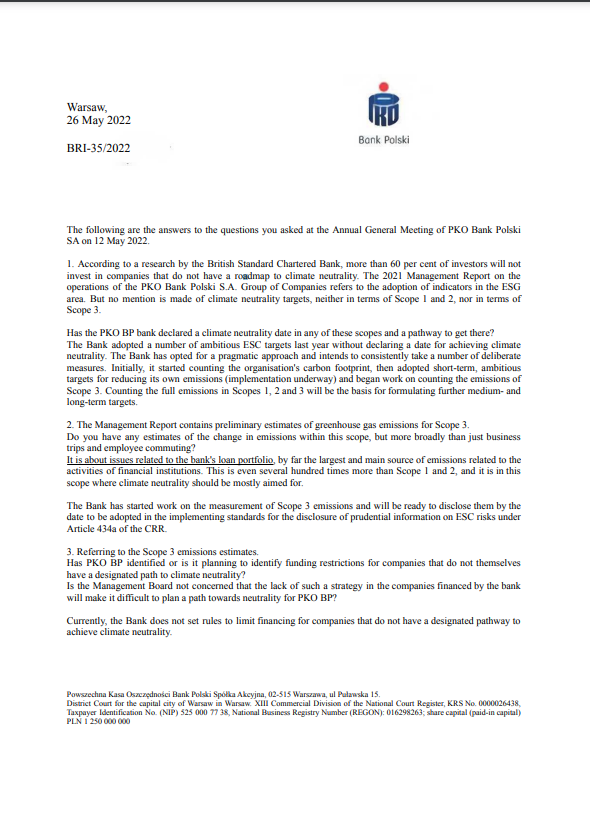
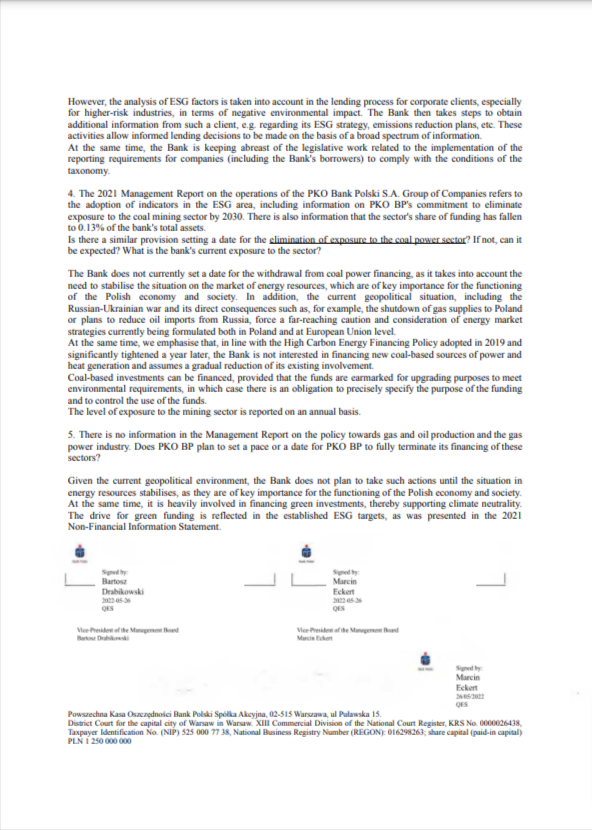
A recording of the general meeting can be found at the link below:
http://ucstream.pl/pkobp/20220512/
Here you can see the photos from the event:
Recent
- Polish coalition against open-pit mining in solidarity with protests in Germany Written on Monday, 16 January 2023 12:59
- Which banks are still financing the global coal industry? Report Written on Wednesday, 16 February 2022 12:57
- Key points from the Limited Utility report Written on Thursday, 03 February 2022 16:35
- Finance Campaigner at Polish Foundation “RT-ON” Written on Tuesday, 04 January 2022 11:11
- The hearing in the CJEU is the result of helplessness of the Polish government in the face of the just transition of the Turów regionThe hearing in the Court of Justice of the European Union (CJEU) regarding the Turów open-pit mine is underway. Despi Written on Tuesday, 09 November 2021 11:18
Foundation "DY-OPMN" is the formal and legal representation of the Polish National Coalition „Development YES - Open Pit Mines NO" – a civil society grassroots movement to prevent plans to build new lignite open pit mines and supporting the transformation of the Polish economy - from the one based on fossil fuels to a resource-efficient and new renewables-based one.
Copyright © 2021 RT-ON. All rights reserved.



